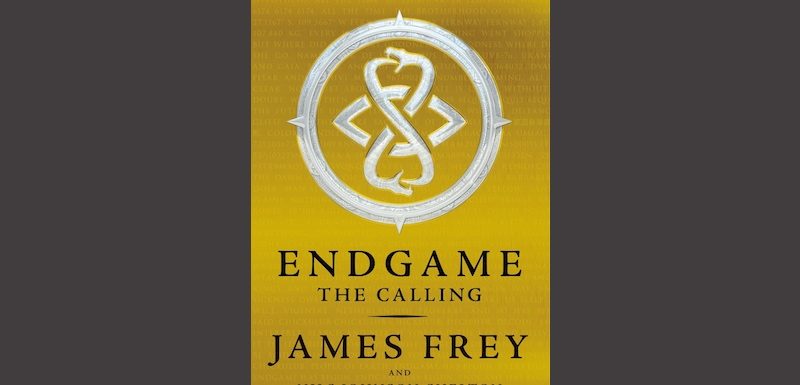 International bestselling author James Frey was in San Diego on October 15 to promote his new project, “Endgame: The Calling.” For this interview, Frey said that what he’s trying to accomplish in this new project is to marry technology with traditional storytelling to create “the first 21st Century book.”
International bestselling author James Frey was in San Diego on October 15 to promote his new project, “Endgame: The Calling.” For this interview, Frey said that what he’s trying to accomplish in this new project is to marry technology with traditional storytelling to create “the first 21st Century book.”
“First and foremost,” said Frey, “Endgame is a book that tells a story like any other book. Hopefully, people will read it and love it and get excited by it. The book has a puzzle written into it and readers can just read the book and love the book or they can choose to engage the puzzle and try to solve it. The first person to solve the puzzle will receive a key that opens a case at Caesar’s Palace in Las Vegas with $500,000 of gold in it.”
Frey said this project was inspired by “Masquerade,” which was written by Kit Williams. Frey read “Masquerade” when he was ten-years-old and, like many others, holds fond memories of that experience. He said, “It was a book that I loved that I thought was awesome and that somehow became more than a book to me. It made me go back and read it over and over again. It got me excited about it, and it was fun and cool and weird and thrilling.”
There were also other factors Frey said influenced the project. “It was also inspired by ancient alien theory and conspiracy theories related to secret societies and the brotherhood of the snake.” As with any creative project, there are critics on both sides of the fence. Some have compared “Endgame” to “Hunger Games,” others claim it’s exactly the opposite. Frey feels that most of those comparisons came out before the reviewers had a chance to actually read “Endgame.”
“I wanted to write a book that we could put a puzzle into it and have a contest,” said Frey. “But, I also wanted to tell an awesome story that I thought was cool and exciting and fresh. I mean, people who’ve actually read the book know it’s not at all like Hunger Games except for the name with the word “game” in each of the titles.”
Should “Endgame” be compared to an interactive book? Frey doesn’t think so. “I think that’s a dirty word. I’m trying to make a 21st Century book. A book that uses technology to enhance it and make it better.”
There are several ways Frey said technology is being used to deepen the reader’s experience. For instance, readers can follow the Twitter feeds for characters, send messages and receive a response, and view videos on YouTube. Frey said, “It’s deepening the experience for the reader. It’s deepening the story. You can see what this person’s life is like outside of the book. You can read the book and never look at any of this stuff. But, if you want to look at this stuff, it’s all there for you.”
“Endgame” is, in a sense, taking a range of communication methods and bringing them together into a single project. The possibilities for this blending of methodologies excites Frey. “I don’t think anybody knows where it’s going to go, but we all know it’s going somewhere. There have been a few early-stage attempts to do stuff like what I’m trying to do, but nobody really knows where it’s going to be or where it’s going to go.”
Frey also said this is not just a new way of packaging an interactive book, a technology that was not readily embraced by consumers. “They haven’t worked,” said Frey. “They’re just not that exciting. People still want a traditional reading experience where they sit down and read, whether that’s a physical book or Kindle a Nook or an iPad. But, I think people are going to find out ways to enhance the story. Ways similar to what we’re doing.”
Fitting all of the pieces together, and making them all available worldwide on a single day was a very complex project. Frey said, “When you’re trying to do something nobody’s ever done before, you don’t have a model to follow. You have to invent your own.” Those issues included everything from the creative process of designing the “Endgame” world to convincing Google to participate to the logistics of distribution.
Creating a puzzle with a $500,000 prize that is bound to attract many players is much like walking a tightrope. Frey said, “We had to build a puzzle that we thought was guessable for readers and that would get them stoked and excited, but we had to make it a puzzle we thought was difficult enough to last more than a couple of days.”
“I think we’re doing something really exciting and fresh and new,” said Frey. “I think the future [of books] is a version of what we’re doing here. We’re just the first to do it. I hope readers will give it a chance. I think we have a great story. Great characters. And an amazing puzzle if you choose to engage it. If not, just a fun book, a super-fun read.”

